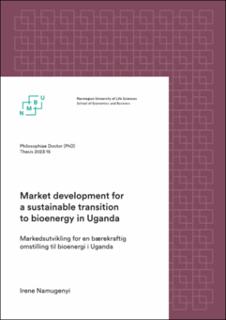| dc.contributor.advisor | Joachim, Scholderer | |
| dc.contributor.advisor | Ståle, Navrud | |
| dc.contributor.author | Namugenyi, Irene | |
| dc.coverage.spatial | Uganda | en_US |
| dc.date.accessioned | 2023-06-06T12:44:25Z | |
| dc.date.available | 2023-06-06T12:44:25Z | |
| dc.date.issued | 2023 | |
| dc.identifier.isbn | 978-82-575-2044-1 | |
| dc.identifier.issn | 1894-6402 | |
| dc.identifier.uri | https://hdl.handle.net/11250/3070162 | |
| dc.description.abstract | Access and use of clean energy persist as a grand societal challenge in Sub-Saharan Africa (SSA) without obvious solutions. This adversely affects other social-technical systems of society like health, education, climate change, environmental conservation, and the economy. This poses a further challenge to the energy transition process, which requires substituting mature, inefficient, and unsustainable biomass technologies with clean alternatives. Thus, exploring the means to address this challenge is of interest to researchers in energy-innovation policy and innovation-sustainability transition for the development and transformation of communities in SSA. To address this challenge, this thesis investigates and elaborates on how developing countries like Uganda can scale up appropriate bioenergy technology transitions. This objective was achieved using four interrelated research papers on two themes. Theme one includes papers 1 and II analyzing the incumbent clean cooking bioenergy systems. The theme aims at identifying windows of opportunity for a sustainable bioenergy transition. Theme two comprising papers III and IV explore how the identified niches could be exploited for a sustainable transition to bioenergy.
The first paper is titled “Do biomass technology innovations improve subjective well-being? Traditional versus Improved cookstoves in Uganda”. It investigates whether biomass innovations improve households’ subjective well-being by comparing traditional with improved cookstoves. Using survey data, results show improved cooking technologies to break households’ intangible cooking-cultural ties, which lowers their subjective well-being.
The second paper is titled “Unsustainable cooking culture: the effect of food preparation routines and improved cookstoves on biomass energy use in Uganda”. The paper examines the energy efficiency associated with improved cookstoves under traditional cooking routines. Results reveal that Uganda’s traditional cooking routines devour the efficiency associated with improved cookstoves if used under similar routines.
The third is titled “Realizing the transition to bioenergy: Integrating entrepreneurial business models into the biogas socio-technical system in Uganda”. The paper assesses the entrepreneurial potential and feasibility of developing a mobile system for purifying and bottling biogas in portable cylinders for wider society consumption and benefit. Using a Transitional Model Canvas and a Feasibility study, results show that biogas has entrepreneurial potential and can improve energy supply and access in developing countries.
The fourth paper is “Valorisation of biogas for market development and remission of “environmental nuisances” in Uganda”. The paper explores the strategies for valorising biogas to increase its commercial marketability and reduce its contribution to environmental damage. Results from pilot production and survey data reveal an existing potential for the biogas business but currently its quality is lacking and associated with emissions of the potent greenhouse gas methane.
This thesis is founded on entrepreneurship and innovation discipline contributing to innovation and sustainability transitions research. It is empirical and action-oriented following an effectuation approach applying mixed methods on mixed data sources. Generally, this thesis contributes to addressing the UN Sustainable Development Goal (SDG) 7 “Ensure access to affordable, reliable, sustainable and modern energy for all”, with multiplier effects on other SDGs. | en_US |
| dc.description.sponsorship | NORAD/NORHED | en_US |
| dc.language.iso | eng | en_US |
| dc.publisher | Norwegian University of Life Sciences, Ås | en_US |
| dc.relation.ispartofseries | PhD thesis;2023:15 | |
| dc.rights | Attribution-NoDerivatives 4.0 Internasjonal | * |
| dc.rights.uri | http://creativecommons.org/licenses/by-nd/4.0/deed.no | * |
| dc.subject | Entrepreneurship | en_US |
| dc.subject | Innovation | en_US |
| dc.subject | Sustainability Transitions | en_US |
| dc.subject | Bioenergy | en_US |
| dc.subject | Uganda | en_US |
| dc.title | Market development for a sustainable transition to bioenergy in Uganda | en_US |
| dc.title.alternative | Markedsutvikling for en bærekraftig omstilling til bioenergi i Uganda | en_US |
| dc.type | Doctoral thesis | en_US |
| dc.subject.nsi | VDP::Social science: 200 | en_US |
| dc.source.pagenumber | 156 | en_US |

